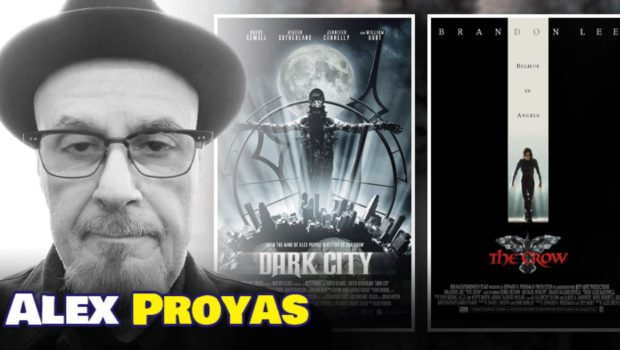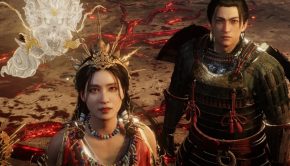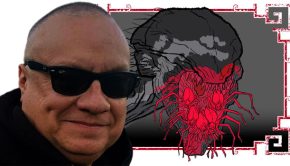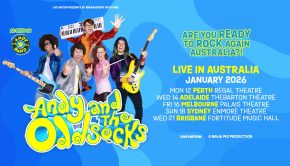Alex Proyas Interview (Supanova 2025)
With Adelaide and Brisbane Supanova’s about to kick-off, we catch-up with Alex Proyas!
Alex is an Australian filmmaker, born in Egypt in 1963, best known for directing cult classics like The Crow (1994), Dark City (1998) and the sci‑fi blockbuster I, Robot (2004). His visually striking style often blends dark atmospheres with philosophical themes, earning him a reputation as a bold, imaginative storyteller.
Alex Proyas Supanova Times
Adelaide
Friday, 31 October
Photos: 2:00pm, 4:30pm
Saturday, 1 November
Photos: 1:10pm
Sunday, 2 November
Photos: 1:25pm
Brisbane
Friday, 7 November
Photos: 3:40pm, 4:55pm
Saturday, 8 November
Photos: 1:00pm
Sunday, 9 November
Photos: 1:05pm
Welcome to Impulse Gamer Alex! So getting straight to the AI elephant in the room, what are your thoughts on all this new AI technology in film?
There’s a lot to unpack. Depending on the day, I’m either morbidly depressed about it or genuinely excited. But one thing is clear: we can’t bury our heads in the sand and hope it goes away. AI is here to stay, in every industry, and it’s already changing the world.
I try to convince my colleagues to embrace it and take the good from it. Don’t plagiarize—artists have been plagiarizing long before AI. It comes down to being an ethical artist. Used properly, AI is a wonderful tool.
Of course, some will use it in nefarious ways, but that’s always been true in the arts. As an individual artist, I choose to use it ethically, for my own creative benefit.
Would you consider using AI for storyboards or visualizations?
The way I work with AI is very specific. I don’t just throw words at it and hope for something useful—that’s the wrong way. As a director, I’ve always known how I want a movie to look and how the story should be told.
When I write, I sketch ideas for world-building. Increasingly, I feed those sketches into AI to refine them into photographic reality, which I can then show to my crew. But the creative journey is always human-led.
For storyboards, I still doodle them myself. I’m very precise about shot composition—lens choice, framing, character placement. On big films, I’ve worked with storyboard artists, but the original vision always comes from me. If I had a storyboard artist today, they’d probably use AI too, but under my direction.
My philosophy is: enslave AI before it enslaves us. I steer the boat, and AI helps us get to the destination faster, cheaper, and more efficiently.
Some people worry AI will take over jobs in film.
Technology has always streamlined workforces. That’s not new. Crews will likely get smaller, but I’ll always work with human actors—that’s a value add for me.
Studios will dictate crew sizes, not me. But here’s the upside: with lower costs, more productions will be made. There’s a voracious appetite for content, and AI will help feed it. So while individual crews may shrink, overall employment in the industry could grow.
Filmmaking has always gone through industrial revolutions—nonlinear editing, digital cameras, even shooting on phones. Each shift lowers costs and opens doors for more voices. For young filmmakers, ignoring AI would be foolish.
Some of your films, like I, Robot, feel like they’ve predicted the future. How does it feel seeing your ideas become reality?
Science fiction has always been an instruction manual for the future. It creates “what if” scenarios that prepare us for what might come.
I grew up immersed in sci-fi, so none of this feels alien to me. In fact, I explored many of these ideas in my films years before they became real. For I, Robot, we worked with MIT students as advisors. Some of them now work at Boston Dynamics, building robots more advanced than we predicted.
Technology is advancing exponentially—faster than anyone can predict. It’s like a runaway train.
Can you tell us about your new film, R.U.R.?
R.U.R. is based on a 1920 play by Czech author Karel Čapek—the play that gave us the word “robot.” It was a warning story, not so much about robots, but about capitalism and the exploitation of workers.
I thought it was the perfect time to retell it, as AI comes online and capitalism itself is under strain. My version is a satire—Dr. Strangelove for the AI generation. It’s also a musical, set in a retro-futuristic 1920s world, made entirely with virtual production.
When will it be released?
We’re aiming for the middle of next year, though we’re still raising financing to complete the visual effects.
Do you have a favourite among your films?
Probably Dark City, especially the director’s cut. It’s the closest I came to my original vision. Recently, I was forced to watch it at a screening in London, and despite its flaws and ropey effects, I was proud of how close it was to what I intended.
Hitchcock used to say his favourite film was always “the next one.” I feel the same. Right now, that’s R.U.R.—unless it gets mangled by financial constraints. It’s completely crazy, satirical, musical, and unpitchable to a Hollywood studio. But I think audiences will enjoy it.
Finally, Gods of Egypt draws on your heritage. Where did that inspiration come from?
My grandfather used to draw Egyptian gods for me when I was a child. He was Greek-Egyptian, and our family traces back to Alexander the Great and Cleopatra. Those myths fascinated me—the gods with animal heads and human bodies.
That’s where the inspiration came from. The Horus and Set myth was the one that best lent itself to a story, and that’s how Gods of Egypt was born.
Alex, thank you for your time. It’s been fascinating talking to you.
Thank you.










